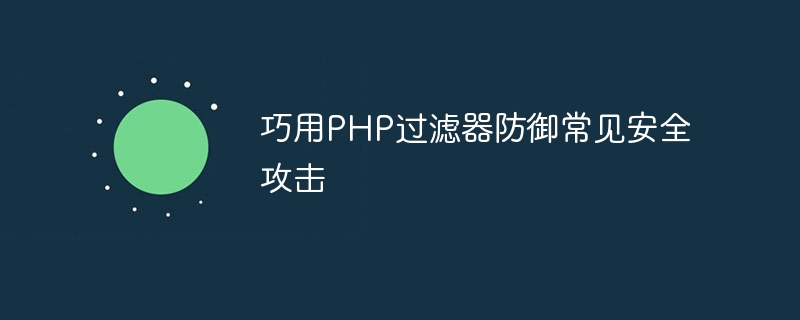Home >Backend Development >PHP Tutorial >How to use PHP filters to defend against common security attacks
How to use PHP filters to defend against common security attacks
- PHPzOriginal
- 2023-08-07 21:39:171075browse

How to use PHP filters to defend against common security attacks
Security is one of the important issues in web development. Malicious attackers are constantly looking for loopholes to gain access to websites and users. Sensitive data. To protect websites from these attacks, developers must take a series of security measures. This article explains how to leverage PHP filters to defend against common security attacks and provides code examples to help you implement secure web applications.
1. What is a PHP filter?
PHP filter is a built-in tool provided by PHP for validating and filtering user input data. It can check whether input data conforms to the expected format through different types of filters and automatically filter out potentially malicious content. PHP filters can be used to process various data types such as strings, numbers, URLs, emails, etc.
2. Defense against XSS attacks
Cross-site scripting attack (XSS) is a common security vulnerability. Attackers steal user information by injecting malicious scripts on the website or in the user's browser. perform malicious operations. To prevent XSS attacks, you can use the FILTER_SANITIZE_STRING filter in PHP filters to filter user-entered string data.
The following is a sample code for filtering the username entered by the user:
$username = $_POST['username']; $filteredUsername = filter_var($username, FILTER_SANITIZE_STRING);
In the above code, we use the filter_var function and the FILTER_SANITIZE_STRING filter to filter the username entered by the user. It automatically removes all HTML and PHP tags, ensuring the input does not contain anything malicious.
3. Defense against SQL injection attacks
SQL injection attack is an attack method against the database. The attacker injects malicious SQL code into the user input to execute unauthorized database operations. operate. In order to defend against SQL injection attacks, you can use the FILTER_SANITIZE_MAGIC_QUOTES filter in PHP filters to filter user-entered string data.
The following is a sample code for filtering the search keywords entered by the user:
$keyword = $_GET['keyword']; $filteredKeyword = filter_var($keyword, FILTER_SANITIZE_MAGIC_QUOTES);
In the above code, we use the filter_var function and the FILTER_SANITIZE_MAGIC_QUOTES filter to filter the search keywords entered by the user . It automatically adds slashes to escape all quotes, ensuring that the input does not affect the execution of the SQL query.
4. Defense against file upload vulnerabilities
The file upload vulnerability means that an attacker can execute arbitrary code by uploading malicious files in the file upload function. To prevent file upload vulnerabilities, you can use the FILTER_VALIDATE_FILE filter in PHP filters to verify the file type and size uploaded by the user.
Here is a sample code for validating files uploaded by users:
$file = $_FILES['file'];
$allowedFormats = array('jpg', 'png');
$maxFileSize = 1 * 1024 * 1024; // 限制文件大小为1MB
// 获取上传文件的扩展名
$extension = pathinfo($file['name'], PATHINFO_EXTENSION);
// 验证文件类型和大小
if (in_array($extension, $allowedFormats) && $file['size'] <= $maxFileSize) {
// 文件验证通过,继续处理上传逻辑
} else {
// 文件验证失败,拒绝上传
}In the above code, we use the FILTER_VALIDATE_FILE filter to validate files uploaded by users. We define the file formats and maximum file sizes that are allowed to be uploaded, and then validate user-uploaded files against these rules.
5. Summary
By rationally utilizing PHP filters, we can effectively defend against common security attacks, such as XSS attacks, SQL injection attacks and file upload vulnerabilities. Use filters to filter and check the content and format of user input data to ensure data security. At the same time, we can also combine other security measures, such as input validation, output encoding, etc., to build more secure and reliable web applications. When writing code, developing good secure coding habits is an important part of ensuring the security of web applications.
The above is the detailed content of How to use PHP filters to defend against common security attacks. For more information, please follow other related articles on the PHP Chinese website!

